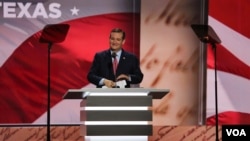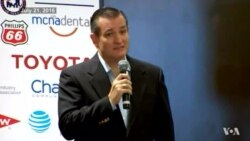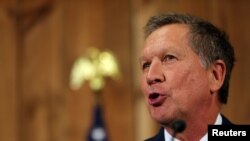Cracks in party unity deepened as the fallout from Ted Cruz's refusal to endorse presidential nominee Donald Trump dominated the fourth and final day of the Republican National Convention.
The Texas senator's convention speech Wednesday, which drew a chorus of boos, will reverberate into the 2020 presidential campaign should Trump be defeated in November.
Cruz, who is known for his long-range political planning and meticulous attention to detail, carries a reputation as a pariah willing to buck his own party. The move focused attention on runner-up Cruz's perceived party disloyalty, even though others in the erstwhile 17-candidate field have not endorsed the New York businessman.
"I was expecting him to unify with everybody else in the party! Everybody's got to endorse Trump!" shouted Sam Mullins, an alternate delegate from Florida, who had to be restrained by security. He was one of many Trump supporters who booed the Senator toward the end of the speech, as it became clear Cruz would not be offering his endorsement.
WATCH: Cruz defends decision not to endorse Trump
"To me, this is really about principles. It's not about putting on a jersey and saying, 'No matter what somebody stands for, I'm going to go out and vote for them,'" Chris Wilson, the former Cruz campaign director of research and analytics, told VOA Thursday.
But it is just the sort of high-risk strategy that is a Cruz hallmark, especially if it reflects a more long-term political calculation.
"Frankly, there are a lot of members of the grass roots that are glad that somebody said what Ted Cruz said," Wilson told VOA.
A data-driven candidate
Before the convention snub, Republican delegates from Texas assembled on the shore of Lake Erie for the Cruz campaign's last gathering.
"Cruz recognizes that he is the face of the most conservative movement probably in decades," said Mandy Benz, who did field work for the Cruz campaign in Minnesota. "You can expect that behind the scenes, we'll be growing that movement."
Key to Cruz's success — before he was sidelined by the Trump juggernaut — was a data-based strategy that went beyond the well-documented tactics employed by President Barack Obama in two successful campaigns. During a VOA visit to Cruz campaign headquarters in Houston late last year, Wilson described how Cruz's team used social media to establish direct contact with voters.
"We're able to not have to worry about the censorship of the Cruz message that could occur by regular media sources. For him to be able to communicate directly whether by Twitter or Facebook or Instagram or Snapchat or whatever media may be utilized," Wilson said.
Wilson and his team also developed innovative methods of micro-targeting voters to better understand election issues that resonated with their concerns and beliefs, and then tailored the Cruz message to help win them over — though Cruz seemed unable to expand his reach beyond his core of conservative primary voters.
More non-endorsements
At the convention, failed presidential candidates Marco Rubio, the Florida senator, who taped his speech, and Wisconsin Governor Scott Walker also addressed delegates and did not endorse Trump.
Ohio governor John Kasich, noticeably absent from the convention held in his home state, was in a heated feud, after refusing to endorse Trump or appear at the convention. Trump's campaign manager, Paul Manafort, said Kasich was "embarrassing" his home state.
Kasich stood in contrast with many other mainstream Republicans, like House Speaker Paul Ryan, who fell in line behind Trump in the name of party unity — perhaps setting him apart from many others should he make another presidential run.
Manette Merrill, a delegate from Washington state who was on the convention floor, said the Trump conflict with Kasich could have more to do "with the push-pull between politicians."
"I'm sure he wanted to be invited. This is his home state," Walters said. She said Kasich's establishment credentials make it harder to judge the grass-roots support he may have if he decides to run again in 2020.
Even after the night's non-endorsements, Merrill said the Trump campaign could still bring people together by focusing on ideas.












